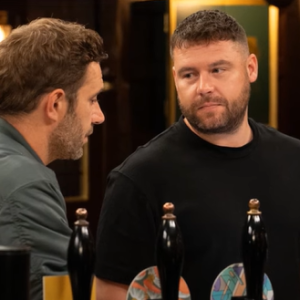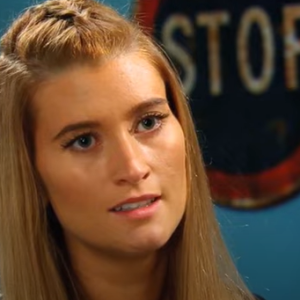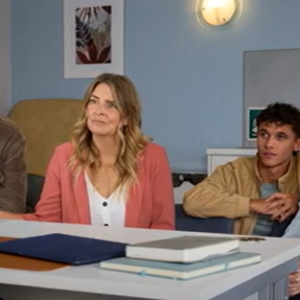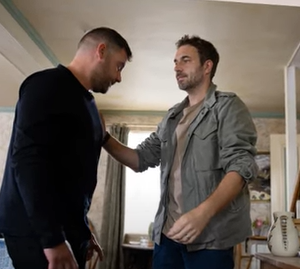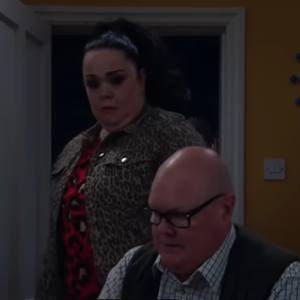The morning’s silence in the village is shattered the instant Robert storms in, the door slamming like a judge’s gavel and heralding a confrontation that will ripple through every life he touches; Charity’s stunned “Heya” hangs in the air before cutting through to the raw assessment that follows—“You look terrible”—and with each clipped sentence from Victoria and John the scene tightens, a pressure cooker of shame, accusation and impossible choices, because this is no ordinary domestic spat but the slow reveal of a man fraying at the edges, a man whose promises to change are measured against bruised trust, whispers of past violence and the icy ultimatum that a single phone call could send him back behind bars. The atmosphere is suffused with dread: Robert’s defenses wobble as he insists he’s “been trying,” Charity’s voice trembles between loyalty and fear, and Victoria’s cold practicality—finding him a therapist and threatening to keep Harry away—forces him to stare at the consequences of his unraveling; even Aaron’s name is invoked as a verdict that adds weight to the humiliation, and a frantic, pathetic attempt to hold on to dignity crumbles into the quiet, humiliating truth that he’s lost more than just employment and friends—he’s at risk of losing his family and the last scraps of self-respect that tether him to hope.
Despite the indictment of his character, the episode refuses to make Robert into a flat villain; instead we see a man alternately bewildered and ashamed, admitting between halting breaths that “one minute I’m fine and then the next minute I just… I don’t know what I’m doing,” while the real world of bills, pregnancy tests and job rejections grinds on around him—the mundane details of a life unravelling provide a devastating contrast to the moral stakes. Charity, juggling her own grief and the fragile possibility of new life, places a call about in vitro DNA tests as if trying to reclaim control; in the café, small mercies arrive in the form of a warm pint and friendly banter, but even there the shadow of what’s happened follows Robert like a stain: he’s rejected for jobs for lack of experience, mocked gently by colleagues, and forced to swallow the contempt of those who once gave him chances—Ray’s easy money feels like a lost salvation and prospects feel thinner than the foam on his ordered drink. Meanwhile, undercurrents of family history surface in casual conversation—Charity’s past loss three years ago, the bitterness of dreams dashed and the way fresh possibilities reopen old wounds—so every ordinary exchange becomes freighted with meaning; Ross’s clumsy attempts at reassurance expose the fragility of male pride, Dylan’s apprentice anxieties mirror Robert’s crisis of purpose, and even light-hearted teasing about surrogacy takes on an edge when hope and trauma live so close together.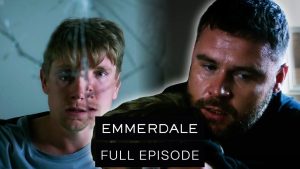
The episode finds its emotional pivot not in a courtroom or a police station but in the quiet, grueling work of intervention: Victoria’s ultimatum and John’s practical help—a therapist’s name and Victoria’s insistence that she’ll pay—force Robert to reckon with a future that will demand change or exact punishment, and the viewer is left holding their breath as Charity attempts to be both backbone and balm. Scenes of vulnerability pile up; Robert’s pleas for forgiveness, his attempts to appear useful—“there’s still a few things I can apply for”—are countered by the blunt reality of being ostracised and the humiliating sting of “one phone call” that could end his freedom. There’s an aching humanism in the way the community responds: some, like Victoria, choose protection over sympathy; others, like Aaron, serve as a moral mirror reflecting back what Robert has become in the eyes of those he loves; and Charity, sandwiched between love and fear, becomes the moral fulcrum whose choices will determine whether Robert collapses entirely or is forced to rebuild from scratch. This tension is where the drama grabs you—always threatening to tip into tragedy, yet measured by the hope that intervention, therapy, and the slow work of reearning trust might pull a man back from the brink.
As the episode moves towards its climax, small domestic beats feel like tectonic shifts: a frantic phone call about pregnancy testing, a mocked attempt to be useful while waiting for apprenticeship paperwork, a bar conversation that layers humour over heartbreak—each moment adds texture to Robert’s collapse and the village’s response. Charity’s quiet attempts to hold the family together are contrasted with John’s more direct, practical approach, and Victoria’s ultimatum marks a turning point that feels earned and terrifying; Robert’s admission that he can’t afford therapy is met with the simple, life-changing kindness of those who refuse to let him fall without trying to help. The stakes are made viscerally real when we are reminded that three years ago Charity lost their baby, that memory still raw and shaping how every decision is weighed; the presence of a surrogate, Sarah, complicates loyalties and desires and forces everyone to face how grief and hope can coexist in painful, unpredictable ways. 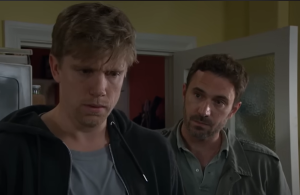
In the denouement, hope and consequence stand face to face: Robert must choose—accept help, go to therapy and confront the darkness within him, or continue down a path that will end in loneliness, legal repercussions and the loss of the life he once had; the episode leaves us with a cliff-edge sense of possibility because Aaron’s presence—and the community’s insistence that Robert be “got together”—introduce the notion that redemption is hard but not impossible. The village watches, judges and sometimes forgives; Charity holds the fragile center, Victoria throws down the ultimatum that might save a child from fear, and John offers a practical lifeline. The final image is not of resolution but of a man confronted by the consequences of his actions and the chance, at last, to accept help—an ending that satisfies the appetite for drama while refusing to simplify pain into cartoon villainy, instead acknowledging the messy work of redemption and the small, stubborn ways a community can hold a broken person accountable and, if they choose, help him heal.
